Everything you need to know about Olive Oil
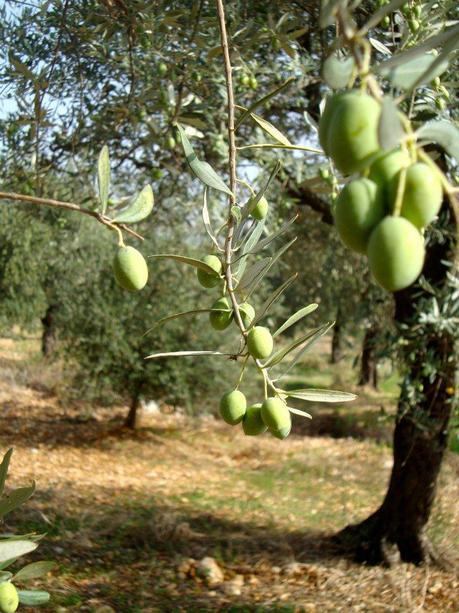
“And a tree (olive) that springs forth from Mount Sinai, that grows (produces) oil, and (it is) relish for the eaters.( Quran 23:20 )”
Today’s contribution comes straight from the Olive Oil industry!
Pearl’s interviewed an avid experienced Food scientist who has been working in the olive oil production for 6 years. It is important for consumers like us know briefly about olive oil production, the sensory characteristic of the best olive oil, and how can we detect the differences or how can they choose the best olive oil brand from the market.
Mr. Mohammad Kobayter is the Quality Assurance and Logistics Manager at KOBAYTER S.A. in Malaga -Spain. Kobayter holds a Bachelor of Science in Food Science and Management from the American University of Beirut (AUB) and he is a certified expert in virgin olive oil tasting (from the University of Jaen, Spain). He previously worked as a Production manager assistant at KOBAYTER FRERES S.A.L. in Lebanon. (Alwazir historic Ad )
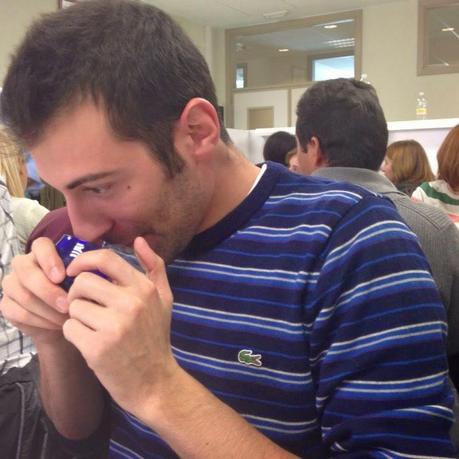
Kobayter, undergoing a sensory test on the olive oil
Food Industry Questions
WHERE DID YOUR INTEREST IN OLIVE OIL COME FROM? I come from a pure family business in the olive oil industry.WHAT WAS YOUR FAVOURITE COURSE IN FOOD SCIENCE? Food chemistry. It made me understand the chemical characteristics of olive oil.
WHAT DO YOU LIKE MOST ABOUT WORKING IN THE FOOD INDUSTRY? It is a highly competitive industry, always developing and adapting to emerging needs and technologies. Yet, olive oil industry has always been a common target for food fraud.
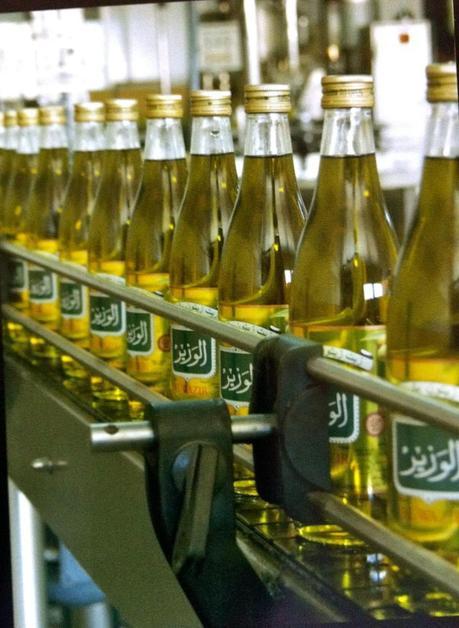
About the Oil Industry
WHAT IS OLIVE OIL? By definition, olive oil is the oil obtained from the fruit of olive trees.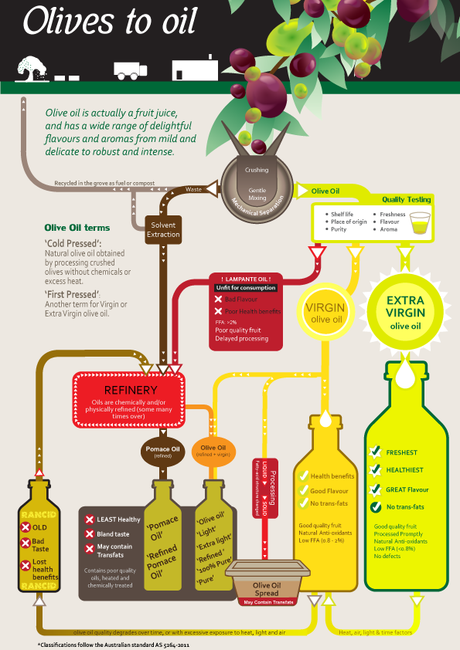
HOW IS OLIVE OIL MADE?
WHAT ARE THE DIFFERENT TYPES OF OLIVE OIL? According to the International Olive Council (IOC), “Virgin olive oils are the oils obtained from the fruit of the olive tree solely by mechanical or other physical means under conditions, particularly thermal conditions, that do not lead to alterations in the oil, and which have not undergone any treatment other than washing, decantation, centrifugation and filtration”. Virgin olive oils fit for consumption as they are include:- Extra Virgin Olive Oil: The highest quality of olive oil. It is a virgin olive oil which has a free acidity, expressed as oleic acid, of no more than 0.8 grams per 100 grams.
- Virgin Olive Oil: Virgin olive oil which has a free acidity, expressed as oleic acid, of no more than 2 grams per 100 grams.
- Lampante olive oil: Virgin olive oil with a free acidity of more than 3.3% that is not suitable for human consumption unless it is refined.
- Pure olive oil (commercially known as “Olive Oil”) is a blend of refined olive oil and virgin olive oil that is fit for human consumption with a free acidity of no more than 1%.
IS OLIVE OIL A HEALTHY PRODUCT?
Olive oil is the healthiest oil you can buy because
of its high content in monounsaturated fatty acid (considered a healthy dietary
fat as opposed to saturated fats), its contents in phenolic compounds (strong
antioxidants) and other compounds such as Vitamin E (antioxidant).
Studies have shown that the regular consumption
of olive oil helps lower the level of blood cholesterol leading to heart
disease, lower the level of blood pressure and the bad low density lipoproteins
(LDL). It might help in fighting cancer, obesity and diabetes.
HOW MANY
CALORIES IN ONE TABLESPOON OF OLIVE OIL?
All olive oils have the same amount of calories: 1 tablespoon (15 mg) equals
120 Kcal.
The major fatty acids in Olive Oil are:
-Oleic acid: a monounsaturated
fatty acid. It makes up to 55% to 83% of olive oil.
- Linoleic acid: a
polyunsaturated fatty acid. It makes up to 3.5 to 21% of olive oil.
-Palmitic acid: a saturated fatty
acid. It makes up to 7% to 20% of olive oil.
- Linolenic acid: a
polyunsaturated fatty acid. It makes up to 1% of olive oil.
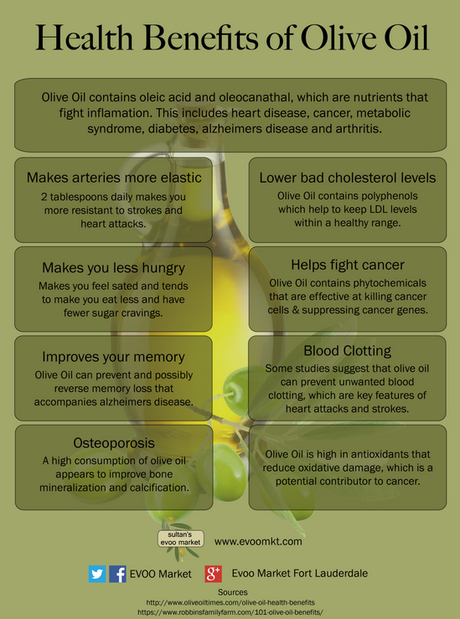
WHAT COLOR IS GOOD OLIVE OIL? The color of olive oil is not an indication of quality. Choose olive oil for taste not for its color.
HOW TO TASTE OLIVE OIL?
- Pour a small amount of oil (15 mL) into a small tapered (Dark Blue) glass.
- Hold the glass in one hand and use the other one to cover the glass while swirling the oil and warming the cup with the palm of your hand to release its aroma.
- Uncover the glass and inhale (one simple breath) from the top of the glass then cover the cup immediately. This first impression will give you an information (almost 70%) about the aroma.
- Inhale 3 separate times, with pauses in between. Then slurp the oil (This is done by sipping a small amount of oil into your mouth while “sipping” some air as well). Finish by swallowing the oil and noticing if it leaves a stinging sensation in your throat.
Fruitiness, pungency and bitterness are three positive attributes of olive oil.
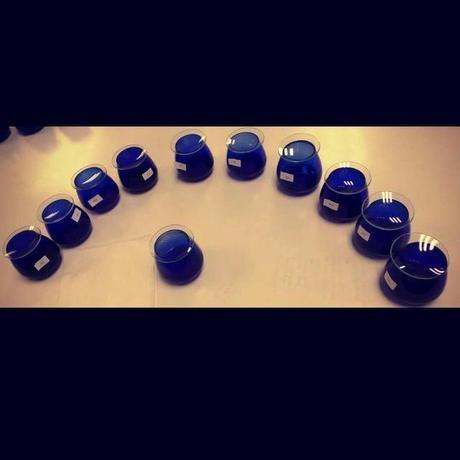
Olive Oil tasting should be done in tapered (Dark Blue) glasses.
HOW TO STORE OLIVE OIL? Olive oil should be stored in a cool and dark place away from heat and light.
SHOULD PEOPLE BUY UNFILTERED OR FILTERED OLIVE OIL? It is a matter of personal preference. Unfiltered olive oil is cloudy. Some people think that cloudy oil is healthier because it is “less processed”. Unfiltered oil has a shorter shelf life and should be consumed quickly.
WHICH COUNTRY MAKES THE BEST OLIVE OIL?
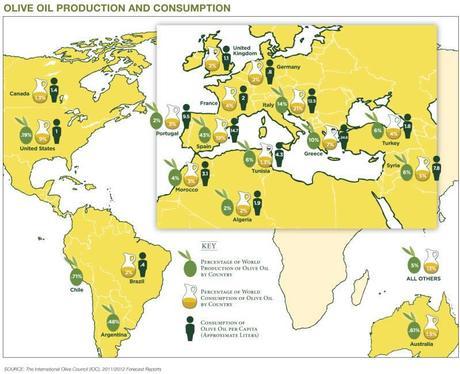
Olive Oil Consumption and Production around the world
The best olive oil is made in all the producing countries in the world. In fact, each country has a specific olive variety with specific characteristics. Spain, the largest producer of olive oil in the world, has 262 olive varieties. “Arbequina” oil, a well-known Spanish oil, is now being produced almost everywhere. “Frantoio” is a well-known Italian variety. Lebanon has the “Ayrouni” variety that is known for its high content in polyphenols. It is not about the country, it is about how to produce good olive oil.
Other questions
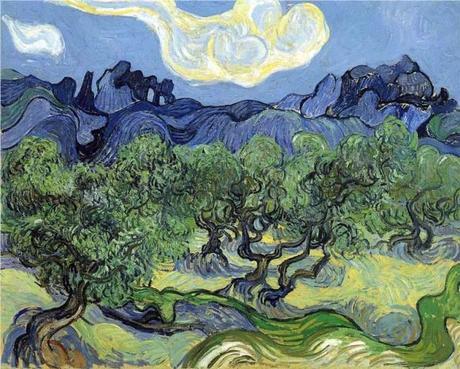
One of his well known works " Olive trees in a mountainous landscape" painted in 1899 by Van Gogh
WHAT DO YOU TELL HEALTH CONCERNED PEOPLE WHO ARE AWARE THAT SOME FOOD/OIL COMPANIES MIGHT DUPE THEM AS IN SELLING SOMETHING BAD FOR THEIR HEALTH?Adulterated olive oil is widespread. Big producing countries are fighting against olive oil adulteration. At the end it is about trusting the brand you are buying.
